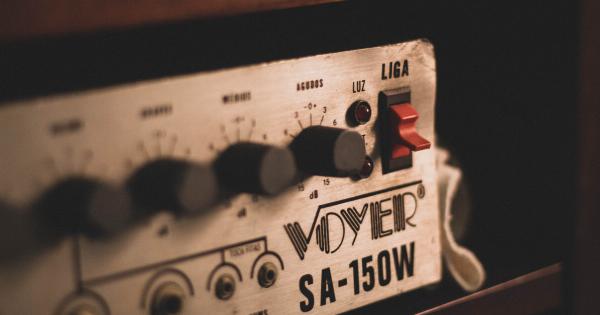Depression is a common mental health disorder that affects millions of people worldwide. While medication can be an effective treatment option, there are also non-drug therapies available that can help combat depression.
These therapies focus on addressing the underlying causes of depression and promoting overall well-being. In this article, we will explore some of the non-drug therapies that can be beneficial for individuals struggling with depression.
Cognitive Behavioral Therapy (CBT)
Cognitive Behavioral Therapy (CBT) is a widely recognized and effective therapy for treating depression. It aims to help individuals identify negative thought patterns and develop strategies to replace them with more positive and constructive thoughts.
CBT also focuses on understanding the relationship between thoughts, emotions, and behaviors. By targeting dysfunctional thinking and behavior patterns, CBT can help individuals combat depression and improve their overall quality of life.
Interpersonal Therapy (IPT)
Interpersonal Therapy (IPT) is another evidence-based therapy that is commonly used to treat depression. IPT focuses on improving interpersonal relationships and resolving any conflicts or difficulties that may contribute to depressive symptoms.
This therapy helps individuals develop effective communication and problem-solving skills, leading to healthier and more satisfying relationships. By addressing relationship issues, IPT can alleviate symptoms of depression and promote emotional well-being.
Mindfulness-Based Therapies
Various mindfulness-based therapies, such as Mindfulness-Based Cognitive Therapy (MBCT) and Mindfulness-Based Stress Reduction (MBSR), have also shown promising results in managing depression.
These therapies incorporate mindfulness practices, such as meditation and breathing exercises, to cultivate present-moment awareness and acceptance. By developing non-judgmental awareness of thoughts, emotions, and bodily sensations, individuals can reduce ruminative thinking and enhance their overall emotional resilience.
Art Therapy
Art therapy is a creative approach to treating depression that involves using various art forms, such as drawing, painting, or sculpting, as a means of self-expression.
Engaging in artistic activities can provide individuals with a safe outlet for their emotions and allow them to explore and process their inner experiences. Art therapy can promote self-discovery, increase self-esteem, and facilitate emotional healing, making it a valuable tool for individuals grappling with depression.
Exercise and Physical Activity
Regular exercise and physical activity have been shown to have significant benefits for mental health, including reducing symptoms of depression.
Exercise stimulates the release of endorphins, also known as “feel-good” hormones, which can improve mood and alleviate symptoms of depression. Engaging in activities such as walking, jogging, swimming, or yoga not only promotes physical well-being but also enhances mental well-being by reducing stress, improving sleep, and boosting self-esteem.
Light Therapy
Light therapy, also known as phototherapy, involves exposure to bright light to regulate mood and alleviate depression symptoms, particularly in individuals experiencing seasonal affective disorder (SAD).
SAD is a type of depression that occurs during the winter months when daylight is limited. By mimicking natural sunlight, light therapy can help regulate circadian rhythms and enhance serotonin production, promoting improved mood and overall psychological well-being.
Support Groups
Joining a support group can be immensely helpful for individuals battling depression.
Support groups provide a safe space for individuals to share their experiences, gain insights from others facing similar challenges, and receive practical advice and emotional support. Connecting with peers who can relate to one’s struggles can help individuals feel less alone and isolated, fostering a sense of community and enhancing overall well-being.
Acupuncture
Acupuncture, a form of traditional Chinese medicine, involves the insertion of thin needles into specific points on the body.
Some studies suggest that acupuncture may be beneficial in reducing symptoms of depression by influencing the release of certain neurotransmitters and promoting relaxation. While more research is needed to fully understand its effectiveness, acupuncture is considered a safe and non-invasive therapy option that may provide relief for individuals with depression.
Music Therapy
Music therapy harnesses the power of music to promote emotional expression, reduce stress, and enhance overall well-being.
Engaging in listening or creating music can evoke various emotions and stimulate the brain’s reward pathways, leading to positive mood changes. Music therapy can be particularly helpful for individuals experiencing depression, as it provides a means of non-verbal communication and emotional release.
Yoga and Meditation
Yoga and meditation practices have long been recognized for their therapeutic benefits, including reducing symptoms of depression. Both yoga and meditation promote relaxation, improve self-awareness, and increase mindfulness.
The combination of physical postures, controlled breathing, and mental focus in yoga, as well as the practice of mindfulness in meditation, can help individuals manage depressive symptoms and cultivate a sense of inner calm and balance.
The Benefits of Non-Drug Therapies for Depression
Non-drug therapies offer several advantages for individuals struggling with depression. Unlike medications, which can have potential side effects and may not be suitable for everyone, non-drug therapies are generally safe and well-tolerated.
Additionally, these therapies aim to address the root causes of depression and equip individuals with practical tools and skills to manage their symptoms effectively. Non-drug therapies focus on empowering individuals and fostering their personal growth, leading to long-term improvements in mental well-being.































